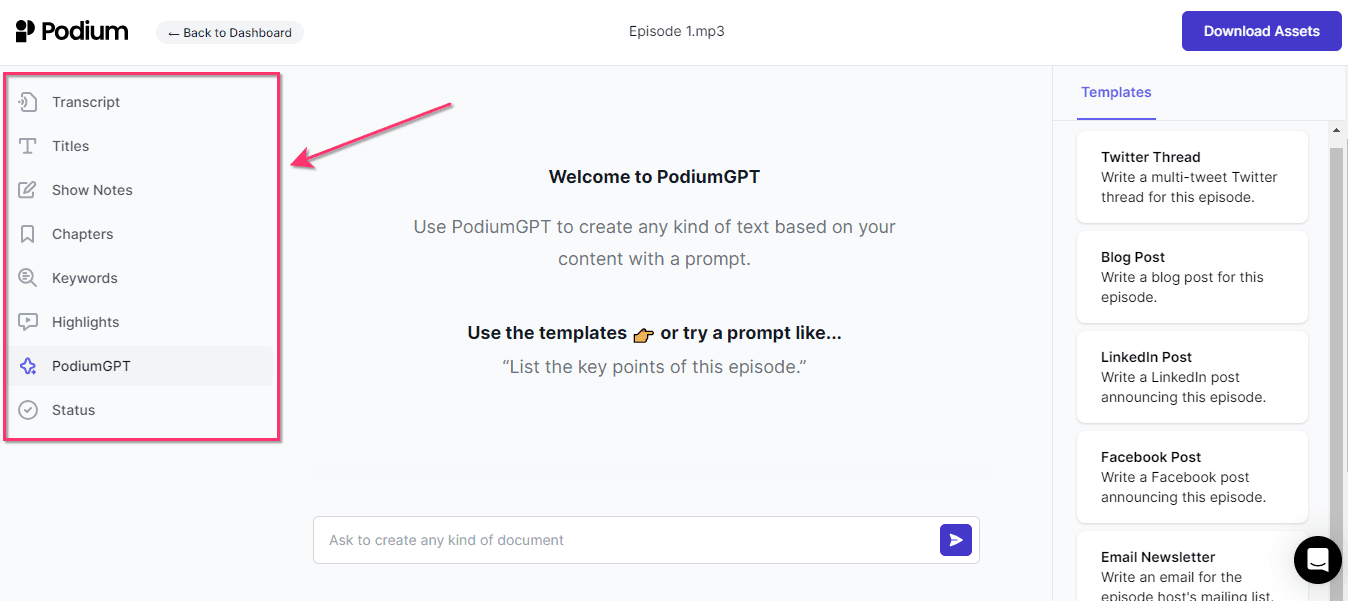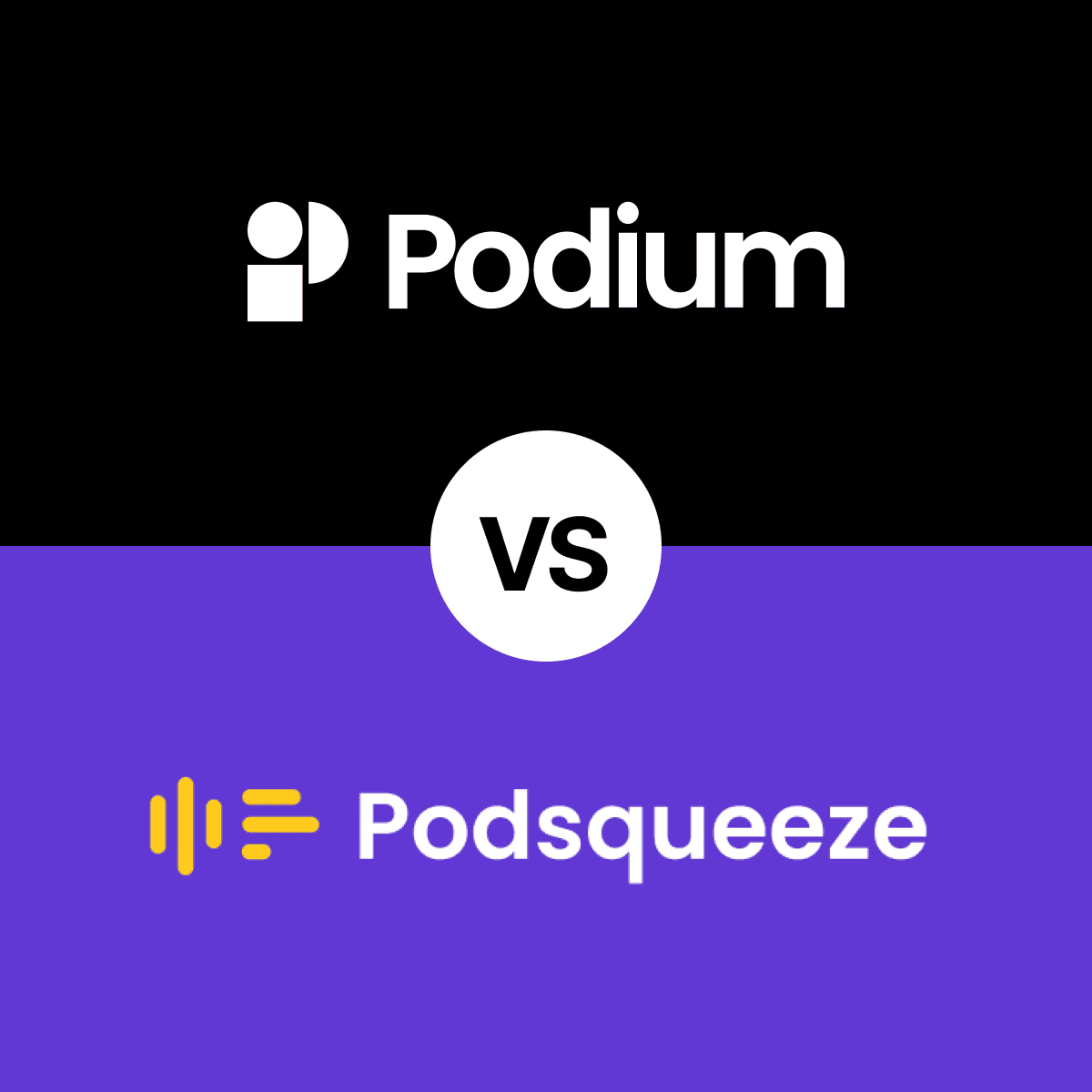Article
Podsqueeze vs. Podium: Which is Best? [2024]
We put Podsqueeze and Podium against each other, here’s how they stack up
Summary
Choosing the right AI podcast copywriter for your show notes, transcripts, and other content is crucial for your podcast's success. This article provides an overview of the factors to consider when selecting an AI copywriter platform for podcast post-production and compares two popular options: Podsqueeze and Podium
Introduction
The podcasting industry is witnessing a remarkable shift with the emergence of AI-driven tools that enhance post-production processes. These tools, designed to generate content such as transcripts and show notes, are becoming integral for podcasters looking to streamline their workflows. Among the array of options available, Podium and Podsqueeze stand out as popular choices. Both platforms are known for offering similar functionalities, yet each has its unique strengths. In this article, we delve into a comparative analysis of Podium and Podsqueeze to determine their respective advantages and ascertain which platform might offer superior overall performance for podcast creators.
Accuracy of the Transcript
In terms of transcription accuracy, Podium excels by producing transcripts that closely resemble natural speech. While both Podium and Podsqueeze demonstrate a high level of accuracy in their transcriptions, Podium has a slight edge, especially in scenarios where the audio quality is suboptimal or the speech is somewhat unclear. Both platforms efficiently identify different speakers, even in complex situations where multiple speakers may overlap or interrupt each other. As such, they are on par in terms of speaker detection. However, when considering the overall transcription accuracy, Podium holds a marginal advantage, though the difference between the two is relatively minimal and may not significantly impact user preference.
Winner: Tie
Quality of the Output
Podium distinctly stands out for the superior quality of its show notes. The platform's writing style is notably nuanced and offers a natural reading experience, setting it apart from the basic summaries typically produced by other platforms. Podsqueeze, while allowing users to customize content through prompts, doesn't quite match the level of sophistication found in Podium's output. Additionally, Podium enhances user choice by offering three variations of show notes, enabling users to select the version that best aligns with their preferences.
In terms of chapter generation, Podium typically creates fewer chapters, averaging around six to seven for an hour-long episode, while Podsqueeze generates a significantly higher number. This aspect ultimately boils down to user preference, with some podcasters favoring a more concise structure and others preferring extensive segmentation. As for other elements like title generation, both Podium and Podsqueeze perform commendably, delivering quality outputs that are generally on par with each other.
Winner: Podium
Features
Both Podium and Podsqueeze present a comparable array of core features essential for podcast production. These include transcription services, show notes creation, title generation, chapter segmentation with timestamps, and keyword identification. This set of features forms the standard toolkit for modern podcasting needs.
Beyond these basics, Podsqueeze offers additional capabilities like creating bullet points, social media posts, blog posts, and newsletter content. Meanwhile, Podium introduces an advanced feature with its AI assistant, PodiumGPT. This tool extends beyond standard content generation, enabling users to prompt the creation of a wide range of written materials, including those offered by Podsqueeze.
A distinctive feature of Podium is its 'highlights' tool, which adeptly identifies key segments of content suitable for generating viral video clips. This feature enhances the platform's utility in content repurposing and audience engagement.
On the visual content front, Podsqueeze offers the functionality to create graphic posts from quotes, complete with a selection of templates, and also generates video clips. In contrast, Podium does not currently provide features for creating visual posts within its platform, focusing primarily on audio and text-based content. This distinction in capabilities may influence user preference, depending on their specific requirements for visual content integration in their podcasting workflow.
Winner: Tie
Ease of Use
Podium distinguishes itself with a highly user-friendly interface, characterized by its intuitive design and streamlined user flow. The platform's dashboard efficiently organizes files, facilitating easy access and management. Each file's contents are displayed on separate pages, with a navigation pane on the left side allowing for smooth transitions between different sections.

This layout ensures a seamless user experience, particularly when handling multiple pieces of content.
Podsqueeze also offers a straightforward and convenient file upload process. Inside a file, the presentation of generated content adopts a tile-like layout. However when accessing this content, users encounter it in pop-up windows.

This means that to view different pieces of content, users need to close one pop-up window before opening another. While this approach is functional, it might be less efficient than Podium's streamlined page navigation, especially for users who frequently switch between multiple content pieces.
Winner: Podium
Integrations
Both Podium and Podsqueeze offer straightforward file upload capabilities for their users. Podsqueeze, however, goes a step further by enabling uploads via an RSS link. Podsqueeze also allows users to just search for their podcast, as Podsqueeze can automatically retrieve episodes that are available online, streamlining the process for podcasters.

Both platforms have limitations in terms of exporting generated content. Currently, users can only download or copy content directly from the platforms’ interfaces. There is a notable absence of integrations for exporting content to external platforms or cloud storage services like Dropbox.
Winner: Podsqueeze
Pricing Model and Pricing Plans
Podsqueeze operates on a freemium model, offering users the ability to process up to 50 minutes of content per month at no cost. For those whose requirements exceed this limit, Podsqueeze provides subscription plans beginning at $15 for 2.66 hours of content each month. The platform has a total of five subscription tiers to accommodate varying content processing needs. However, it is important to note that Podsqueeze does not offer the option to purchase credits individually for occasional excess use.
Conversely, Podium introduces users to its services through a free trial, allowing the processing of three hours of audio without charge. Following the trial period, subscription plans are available starting from $14 for 3 hours of content per month. Additionally, Podium caters to users preferring a non-subscription model or needing additional processing capacity within a month by offering credit packs.
When comparing the two, Podium’s pricing structure is slightly more advantageous, particularly due to the added flexibility provided by the credit packs. This feature enhances its appeal, especially for users with fluctuating or unpredictable content processing needs.
Winner: Podium
Conclusion
Both Podium and Podsqueeze demonstrate their strengths in areas such as transcript accuracy, showcasing a solid foundation in an essential podcasting feature. However, when delving deeper into the overall user experience and value, Podium distinguishes itself. It excels with its superior content quality, more intuitive user interface, and greater cost-effectiveness. These factors collectively contribute to Podium's edge over Podsqueeze in this comparison. For podcasters seeking an efficient, user-friendly, and budget-conscious platform, Podium stands out as the more advantageous choice, offering a comprehensive solution that aligns with the diverse needs of modern podcast production.
